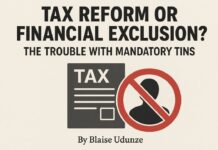A Nigerian woman based in the United States has regained control of her finances after years of struggling under the weight of “Black Tax” — the cultural pressure to consistently send money home to support extended family members.
According to Adedayo Ayoola, a financial advisor and insurance consultant who shared the story, the woman had lived in the U.S. for over five years but had no tangible investments to show for her hard work. Despite earning decently, most of her income went toward supporting her immediate and extended family in Nigeria, including funding her siblings’ university education and covering bills and daily expenses.
“She felt stuck and overwhelmed,” Ayoola said. “Two of her siblings she supported through school now work in the tech industry, yet the pressure didn’t ease. Instead, new financial requests came from uncles, aunts, and cousins—some even demanding she build them a house.”
Seeking a sustainable solution, she reached out to Ayoola after watching one of his videos on Black Tax. During their consultation, Ayoola introduced her to a diaspora-focused insurance investment plan — a dual-purpose product that allows disciplined savings while offering financial protection.
Under the plan, she committed to investing ₦3 million annually. Over time, the investment is projected to grow into a structured portfolio of ₦45 million, with potential returns of up to ₦22.5 million. Additionally, the policy offers life insurance coverage of ₦32 million, ensuring her family remains financially protected in the event of unforeseen circumstances.
“From the moment she started the plan, her money began working for her,” Ayoola said. “More importantly, it gave her the power to say no to unreasonable financial demands.”
Although Ayoola briefly lost contact with her due to a misplaced phone, the client reconnected weeks later to finalize the investment, marking what she described as a turning point in her financial life.
The story highlights a growing concern among Nigerians in the diaspora, many of whom juggle multiple jobs and remittance obligations without building personal wealth. Ayoola believes insurance-backed investments offer a practical escape from this cycle.
“Helping family is important, but not at the expense of your own future,” he noted. “Many Nigerians are silently suffering under the weight of Black Tax. Financial planning, especially through investment-linked insurance, is a smart way to break free and build something meaningful.”
Ayoola is encouraging other Nigerians, both at home and abroad, to explore similar solutions that combine financial discipline with long-term security.














